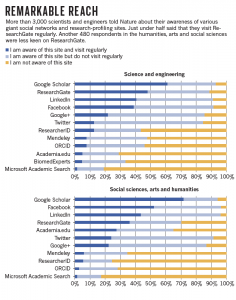W jaki sposób naukowcy wykorzystują Social Media? Interesujący artykuł w Nature.
Ijad Madisch, a Berlin-based former physician and virologist, tells this story as just one example of the successes of ResearchGate, which he founded with two friends six years ago. Essentially a scholarly version of Facebook or LinkedIn, the site gives members a place to create profile pages, share papers, track views and downloads, and discuss research. Nnadi has uploaded all his papers to the site, for instance, and Romeo uses it to keep in touch with hundreds of scientists, some of whom helped him to assemble his first fungal genome.
More than 4.5 million researchers have signed up for ResearchGate, and another 10,000 arrive every day, says Madisch. That is a pittance compared with Facebook’s 1.3 billion active users, but astonishing for a network that only researchers can join. And Madisch has grand goals for the site: he hopes that it will become a key venue for scientists wanting to engage in collaborative discussion, peer review papers, share negative results that might never otherwise be published, and even upload raw data sets. “With ResearchGate we’re changing science in a way that’s not entirely foreseeable,” he says, telling investors and the media that his aim for the site is to win a Nobel prize.
z Online collaboration: Scientists and the social network : Nature News & Comment.

